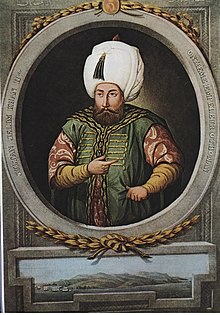Salim II
| Selim II سليم ثانى |
|||||
|---|---|---|---|---|---|
| Sultan of the Ottoman Empire Kayser-i Rûm Custodian of the Two Holy Mosques Caliph of Islam |
|||||
 |
|||||
| 11th Ottoman Sultan (Emperor) | |||||
| Tenure | 7 September 1566 – 15 December 1574 | ||||
| Sword girding | 8 September 1566 | ||||
| Predecessor | Suleiman I | ||||
| Successor | Murad III | ||||
| Born | 28 May 1524 Constantinople, Ottoman Empire |
||||
| Died | 12/15 December 1574 (aged 50) Constantinople, Ottoman Empire |
||||
| Burial | Hagia Sophia Mosque, Istanbul | ||||
| Consort | Nurbanu Sultan | ||||
| Issue |
Murad III Şehzade Abdullah Şehzade Osman Şehzade Mustafa Şehzade Süleyman Şehzade Mehmed Şehzade Cihangir Ismihan Sultan Şah Sultan Fatma Sultan Gevherhan Sultan Ayşe Sultan |
||||
|
|||||
| Dynasty | Ottoman | ||||
| Father | Suleiman I | ||||
| Mother | Hürrem Sultan | ||||
| Religion | Sunni Islam | ||||
| Tughra |  |
||||
| Full name | |
|---|---|
| Selim bin Suleiman |
Selim II (Ottoman Turkish: سليم ثانى Selīm-i sānī, Turkish: II.Selim; 28 May 1524 – 12/15 December 1574), also known as "Selim the " (i.e. "the drunkard", Selim; Mest Selim) and as Sarı Selim ("Selim the Blond"), was the Sultan of the Ottoman Empire from 1566 until his death in 1574. He was a son of Suleiman the Magnificent and Haseki Hürrem Sultan. Selim had been an unlikely candidate for the throne until his brother Mehmed died of smallpox, his half-brother Mustafa was strangled to death by the order of his father, and his brother Bayezid was killed in a coordinated effort between him and his father.
Selim was born in Constantinople (Istanbul), on 28 May 1524, during the reign of his father Suleiman the Magnificent. His mother was Hürrem Sultan, a slave and concubine who was born an Orthodox priest's daughter, and later was freed and became Suleiman's legal wife.
In 1545, at Konya, Selim married Nurbanu Sultan, whose background is disputed. It is said that she was originally named Cecelia Venier Baffo, or Rachel, or Kale Katenou. She was the mother of Murad III, Selim's successor. Hubbi Hatun, a famous poet of the sixteenth century, was a lady-in-waiting to him.
Selim II gained the throne after palace intrigue and fraternal dispute, succeeding as sultan on 7 September 1566. According to one source he became the first sultan who took no interest in military matters and was willing to abandon power to his ministers, provided he was left free to pursue his orgies and debauches, earning him the byname of "Drunkard".Kinross, in The Seeds of Decline (1977), suggests a connection between Selim's decadence and his decision to invade Cyprus rather than supporting the Morisco Revolt (1568–1571) in Granada, as well as in the manner of his death: Selim died in Topkapı Palace after a period of fever brought on when he drunkenly slipped on the wet floor of an unfinished bath-house and received a head injury.
...
Wikipedia
